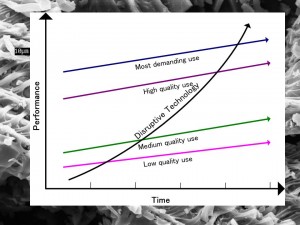The notion of disruptive technology or disruptive innovation is not new, in fact it’s been around for nearly 2 decades. I confess it wasn’t something I’d given much thought to until recently (thanks Kristi!) but now that it is on my radar I have, of course, been thinking of it in terms of whether it is applicable to biochar.
Clayton Cristensen, a Harvard professor, coined the term ‘disruptive technology’ back in the late ‘90’s to describe the ‘process by which a product or service transforms an existing market by introducing simplicity, convenience, accessibility, and affordability’ (See more here). I would argue that in an era of increasing resource constraints and climate change disruptive technology 2.0 should add sustainability to their list of attributes (even though sustainability is an increasingly abused and misunderstood word these days!). McKinsey describes disruptive technology a bit more succinctly: Advances that will transform life, business, and the global economy.
One of my personal favorite disruptive technologies is the cell phone. Not only did it disrupt the quaint plug-in phone and the entire telecom industry, but it has displaced an increasing number of other products from watches to cameras to GPS equipment. I wasn’t all that convinced that biochar should be considered a disruptive technology until I read through some of Wikipedia’s examples and stumbled upon the concept of plastic being a disruptor for wood, metal and glass. This got me thinking that in a world where all sorts of non-renewable resources are becoming more and more scarce, that products made from renewable resources are increasingly likely to displace those made from non-renewables. [This is the notion of the ‘bio-based economy’ that you will start to hear more about soon from the Ithaka Institute for Carbon Intelligence.]
To be clear, I don’t see that biochar used as a soil amendment is particularly disruptive but rather as synergistic with other soil amendments and fertilizers. Biochar as a soil amendment is definitely not cheaper than many alternatives at the moment either. However biochar used in products that are currently made using either non-renewable materials or materials that have a large carbon footprint, that I can definitely see as a disruptive technology. The biochar building material is a great example (i.e. displaces the use of cement which is responsible for significant GHG emissions). In addition, there are some exciting new biochar based products that are in the research pipeline showing promise (e.g. biochar used in microbial fuel cells, 3D printing, etc.). These bio-based products have the capacity to transform life at its most fundamental by sequestering carbon in long-lived products which will be necessary if we are to rebalance levels of atmospheric carbon. Biochar based products can also transform business and the global economy by supplanting non-renewable materials which are experiencing increased price volatility with a highly renewable, ubiquitous material made from what is often currently considered a waste.


